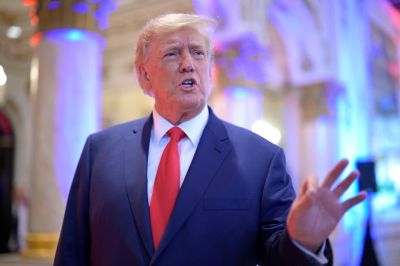The delegates to the Constitutional Convention had a particular goal in mind while designing the presidential selection system over the summer of 1787: reinforce the office’s independence from Congress. By the end, they established an executive whose capacities and authorities were unprecedented for a republican government.
Pierce Butler of South Carolina argued that his fellow delegates had been overly influenced by their opinions of George Washington’s virtue when designing such a robust presidency. Yet Butler overstated his case. A key feature of the debate during the convention was how best to encourage responsible behavior from a chief executive when in office—which, in turn, was predicated on not having another “George Washington” to select after George Washington became the first president.
Before the advent of party politics in 1800, the framers presumed that the Electoral College system would guarantee a president of national repute—that is, someone with sound character and a strong record. In 1796, John Adams and Thomas Jefferson could claim broad experience in the public arena. But, arguably, part of the reason Jefferson lost to Adams was the former’s less-than-spectacular tenure as Virginia’s governor during the Revolution. Jefferson also suffered for his reputation as, at best, an agnostic when it came to Christianity and a providential god.
No doubt, the election in 2024 will largely turn on such policy issues as the state of the economy, the border crisis, and the progressive woke agenda. But the question of character and personal traits that so exercised the framers has resumed a central place in today’s presidential elections. Lest we forget, Joe Biden’s victory in 2020 was in no small measure the result of a goodly number of Republicans and independents rejecting Donald Trump despite otherwise supporting the GOP.
Recent events seem sure to guarantee that the character of the two current frontrunners—Trump and Biden—will continue to occupy center stage in the 2024 race.
In Trump’s case, the result of E. Jean Carroll’s civil suit against him in New York for battery and defamation brought the character issue to the fore again. And unlike Trump’s scandalously demeaning remarks about women in the Access Hollywood tape, which many 2016 voters put aside as idle banter or “locker room talk,” the trial in New York was about an actual predatory, sexual assault. The best Trump can say is that the jury didn’t find that Carroll had proved that Trump raped her; that won’t endear him to already skeptical female and independent voters.
It’s also notable how many of Trump’s former aides have brought up Trump’s character defects, with the most recent notable example being former Attorney General Bill Barr. Even if you agree with the former president’s policy agenda, “he’s the last person who could actually execute them and achieve them,” Barr argued. “He does not have the discipline, he does not have the ability for strategic thinking and linear thinking or setting priorities or how to get things done in the system.” In some respects, Barr is just saying what a majority of Americans already know after watching the chaos of Trump’s four years in office. But such direct comments by a senior member of his cabinet will, undoubtedly, become a staple of opposition campaign ads.
The current president’s character problem is not nearly as serious, but it lurks nevertheless. When Biden ran for the Oval Office and won, he said his duty was “bringing America together. Uniting our people. And uniting our nation.” Yet Biden said one thing and did the opposite. His policies, whether one agrees with them or not, have hardly been designed to help overcome the polarization that grips the body politic. Many voters have little reason to trust the “good ol’ Joe from Scranton” persona the second time around.
A more serious issue for Biden the person, of course, is his age. He, not surprisingly, looks 80, walks like an 80 year-old, and, regularly, like an 80 year-old, forgets things. As much as the White House staff tries to limit his appearances and press availability, a president cannot avoid being in public. Americans have taken notice, with more than two-thirds in a recent poll now saying he is too old to be president. Even if reelected, the vice presidency will take on an outsize importance as there is a good chance that the president will not finish his term in office. Yet one would be hard pressed to find a majority of Americans who think Kamala Harris is ready for prime time.
There is no way of knowing for sure how these issues of character and individual traits will influence either the primaries or the general election. But they almost certainly will matter more than in previous elections. In that regard, it is indeed back to the future.





Please note that we at The Dispatch hold ourselves, our work, and our commenters to a higher standard than other places on the internet. We welcome comments that foster genuine debate or discussion—including comments critical of us or our work—but responses that include ad hominem attacks on fellow Dispatch members or are intended to stoke fear and anger may be moderated.
With your membership, you only have the ability to comment on The Morning Dispatch articles. Consider upgrading to join the conversation everywhere.